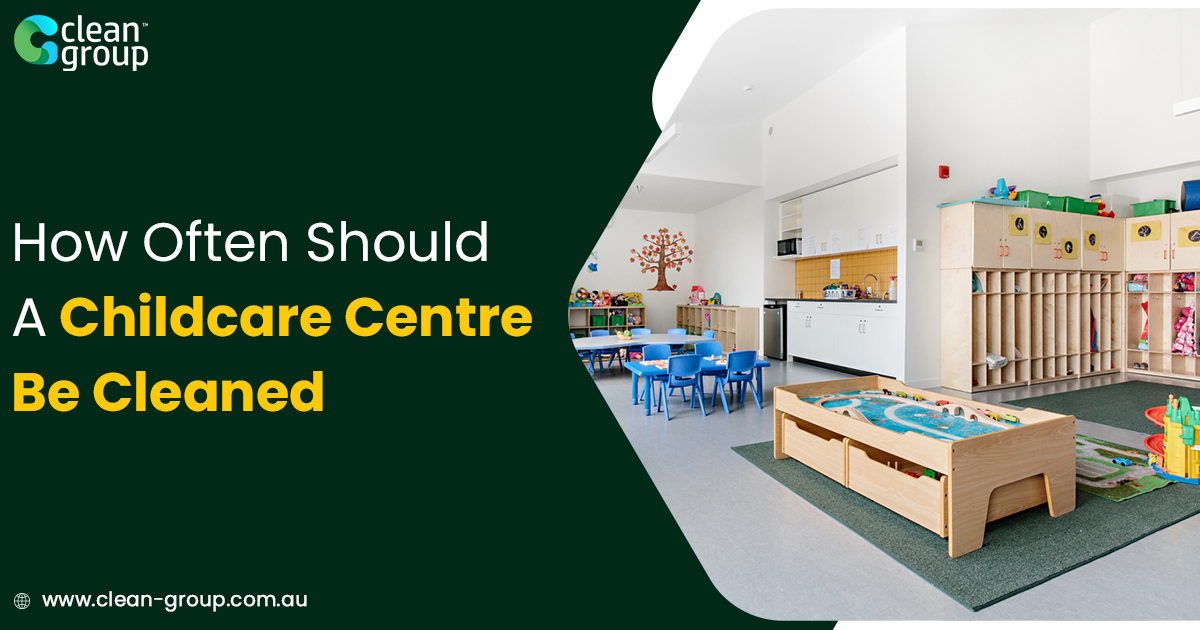Childcare cleaning and sanitizing regularly is the most important step in reducing viruses, bacteria, and protozoa. A childcare setting could be the breeding environment for germs if it is not regularly cleaned.
Children are more likely to reach surfaces that are contaminated, such as toys that they put in their mouths, cups, plates, food utensils, and cot rails. And other surfaces which could be very contaminated with germs such as toilets and nappy-changing areas. Therefore, According to Clean Group experts, strict instructions and guidelines should be in place for regular childcare cleaning, sanitizing, and disinfecting. In this article, we’ll go through all the steps needed to keep your childcare centre clean.
When Should Cleaning Be Undertaken in a Childcare Center?
Carpets and mats should be steam cleaned at least every six months and daily vacuumed. Curtains should be cleaned whenever they look dirty and regularly washed every six months. The kitchen area in a childcare centre should be weekly cleaned and annually fully washed.
Kitchen cupboards should be always visibly clean and washed once or twice every six months using hot water and detergents. And same goes for food preparing areas such as tables or benches.
Areas such as food tables should be clean and disinfected before and after each meal and in between the preparation of cooked and raw foods.
Other kitchen surfaces such as sinks, floors, and cabinet handles, should be cleaned and disinfected once or twice per day or even more if the area was soiled.
What Should Be Cleaned in a Childcare Center?
As children tend to reach and use the same objects and surfaces such as toys and toilets, a childcare centre needs to have regular commercial cleaning services for kitchens, toilet areas, toys and playing items or equipment, laundry, cushions, and nappy changing areas and surfaces, bedding and other linens.
The Essentials of Childcare Centre Floor Cleaning
Taking some time to clean everything at a childcare centre may not be easy as looking after the children in your care is enough responsibility in itself so when it comes to floor cleaning you might be struggling a little to reach the level of hygiene you would want.
However, not cleaning the floors thoroughly might have some consequences which might be significant as the children might get sick and it might be a simple infection like a cold or a serious illness like asthma.
Therefore, cleaning floors in childcare centres must be thorough and regular. Here is a list of essentials you need for childcare centre floor cleaning:
- Vacuum daily
- Fully clean the floor every four to six months and on every major spill occasion
- Disinfect at least twice a week.
- Remove dust daily
- Use a wet mop and disinfect the areas that have high contact at least three times a week
- Use detergent to clean after dusting
- If you are vacuuming the carpets, check the filter and change it when necessary
How Often Should Regular Cleaning Be Undertaken in the Kitchen in Childcare?
Table surfaces and high chairs should be disinfected and cleaned before and after meals. Food preparation areas such as tables and benches should be cleaned and disinfected before and after food is served and in between preparations.
All kitchen surfaces must be cleaned and disinfected once or twice daily including sinks, doors, cabinet handles, and floors, and in case they were visibly unclean, they should be cleaned and disinfected more than twice a day.
When it comes to fridges, they must be weekly cleaned, including removing food spillage from the fridge floor and cleaning racks. You might need to defrost for this part of the process.
Microwaves and ovens should be cleaned on a monthly basis or even on a weekly basis if there were food spillage. And for washing hand basins in kitchens, they should be cleaned and disinfected at the end of every day or more often if it was visibly soiled.
How Often Should Toys Be Cleaned in Childcare?
Washing and cleaning toys regularly are essential to reduce the spread of germs and infections. Toys should be washed at the end of every day, especially the ones younger children play with. Toys should be washed in warm water with detergent, then rinse thoroughly.
Some toys can be washed in a dishwasher (not at the same time as dishes) and can be dried out in the sunlight. Avoid buying non-washable toys, unless they will be assigned to one child and kept with that child only.
When it comes to books, books are easy to clean, you only need to dust it off and clean it with a moist cloth and a detergent, keep the books out of reach until they are dry, and then they are safe to use.
If you notice your child sneezing on a toy or putting a toy in their mouth, or even if the toy was used by an unwell child, make sure to collect and wash those toys by the end of each day. You can also try splitting the toys into two parts daily, part for washing, and part for playing and keep rotating the two parts each day.
In the nappy change area, you can try having two boxes of toys for your child; one for clean toys and one for toys that need washing, you can give them one clean toy while they are being changed, and right after you are done, you can put it in the box for the toys to wash.
The Consequences of an Unclean Childcare Center
Every childcare centre must act to control the spread of infectious diseases which includes cleaning the body fluid spills such as sneezing and coughing, personal hygiene, and facility’s overall level of cleanliness.
The consequences of not following the proper instructions, especially in childcare could be life-threatening, as diseases can easily transfer from one child to another, the infections could be as simple as cold or dangerous like asthma.
This is because infections move faster among children as they play with the same toys, play at the same playgrounds, and touch the same surfaces every day, the illnesses could spread through body fluids or direct contact.
In some cases, unclean childcare centres might lead to causing and spreading diseases such as food-borne illnesses like Salmonella, Diptheria, giardiasis, hepatitis A, B, and C, measles, and German measles (rubella), bacterial or viral meningitis.
Therefore, keeping the childcare centre clean and sanitized is as important as the care you give the children.
Taking care of a child is a wonderful job but it is not as easy as it may look, as children need special care and need to be in sanitized places at all times to prevent any infections or diseases, and follow the Know about commercial restroom cleaning checklist 2021 facts you should know.

